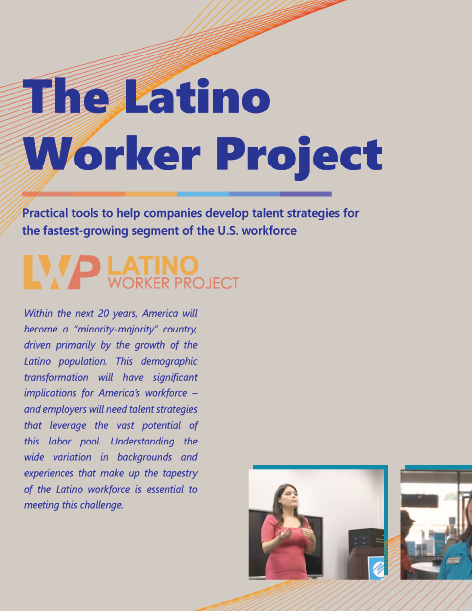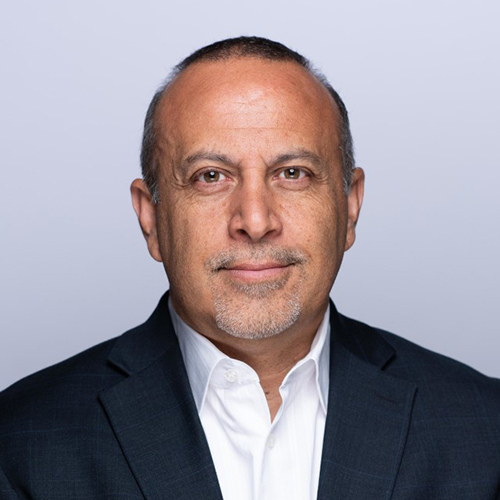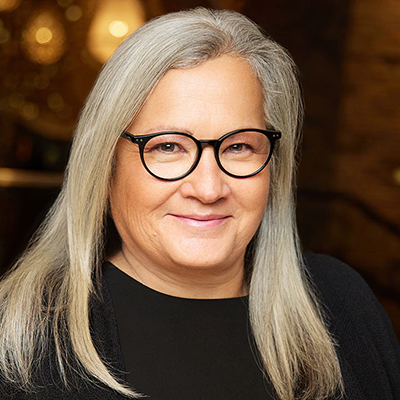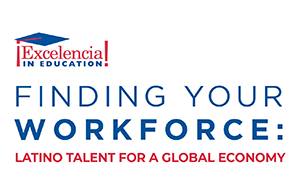
The Latino Worker Project
| HR Policy Association, through its Council on Inclusion and Diversity, is excited to present a unique study designed to help HR professionals develop a deeper understanding of the fastest growing segment of the U.S. workforce – the Latino worker. The Latino Worker Project serves as the definitive resource for those seeking to more effectively attract and engage Latino workers at all levels of their organizations. Through research and in-depth interviews with workers, HR professionals, and other experts in the field, the project delivers a timely look at the demographics, culture, and values of this complex group. It also offers practical tools designed to help companies develop talent strategies based on the value propositions that resonate with this critical segment of our country’s workforce.As the largest and fastest growing ethnic minority, Latinos represent 19% of the U.S. population and over three quarters of net new workers between 2020 and 2030. This “Latinization” of the workforce is taking place as companies continue to face challenges in finding and engaging talent in the post-pandemic environment. These labor market dynamics mean that successful talent strategies of the next decade will depend on the ability to connect with the emerging Latino workforce. The Latino worker will increasingly shape how companies define their employment value proposition. What strategies and messages will attract a young Latino worker for whom large corporations - and the higher education needed to succeed in their world - are largely viewed as unrelatable or out of reach? How can companies secure the engagement of this workforce in a manner that will make investing in their development economically viable? In short, how do companies connect with the Latino worker? The Latino Worker Project provides companies with information and insights on this key segment of the workforce. Discussions with Latino workers in member companies tell us what companies are getting right, what they can do better, and how they can leverage aspects of Latino culture to engage workers in their organization’s mission and value proposition. | Practical tools to help companies more effectively attract and engage the fastest growing segment of the U.S. workforce |
From the Project Newsroom
Finding Your Workforce: Latino Talent for a Global EconomyExcelencia in Education Excelencia in Education released “Finding Your Workforce: Latino Talent for a Global Economy.” This brief initiates a series that represents the latest extension of Excelencia’s hallmark work of bringing national attention to colleges and practices advancing Latino talent, strengthening our economy, and ensuring America’s future. Today, Excelencia is releasing the full series highlighting Latino talent in three fields: Science, Technology, Engineering, and Mathematics (STEM); Health; and Education. This series is a resource for more informed dialogue with multiple audiences to advance Latinos’ achievement in higher education and beyond into the workforce. |
As demographics shift, why HR needs to understand Latino cultureBy Dawn Kawamoto | Human Resource Executive Although Latinos are expected to represent 20% of all U.S. workers by 2030, many employers are unfamiliar with Latino culture and how it can influence the core values this population brings to work, say the authors of the recently released Latino Worker Project report by the HR Policy Association. This demographics shift will create a workforce unlike any “in the history of this country,” says Mike Madrid, a partner with political consulting firm GrassrootsLab and co-project leader on the Latino Worker Project report. |
New Report Reveals What is Important at Work for Latinos, the Nation’s Fastest Growing Demographic WASHINGTON, DC – Family, relationships and hard work are the key values that influence employment decisions by Latinos, America’s largest and fastest growing ethnic group, according to a new study by HR Policy Association. The Latino Worker Project spoke to over 150 Latino workers across 15 companies about their views on what is important at work and how Latino culture influences attitudes and behaviors in the workplace. Based on these insights, the Latino Worker Project offers recommendations for companies to consider as they develop talent strategies for a changing workforce. Read the full press release here. |
Opinion: In a post-affirmative action world, employers should learn from California’s experience The Supreme Court’s decision in June in Students for Fair Admissions vs. Harvard, striking down the use of race as a factor in college admissions, will significantly change campus diversity. While that ruling was limited to the educational setting, America’s largest employers are already worried that their consideration of race in employment decisions might result in legal challenges. Many companies are reexamining how to translate their commitment to diversity into programs that are consistent with a new legal reality. They should look to California’s experiences with race-neutral policies for insight in navigating the post-affirmative-action world. |
Latina workers are on the rise. How can companies tap their full potential? This month, Mexico made history. In a development at once astounding and inspiring, the 2024 presidential nominees of the country’s two major electoral groups are women. Xóchitl Gálvez and Claudia Sheinbaum are both accomplished politicians, and one of them is almost certain to take office late next year. And while the U.S. has a vested interest in the outcome of the election, these two women should also remind us of the substantial untapped potential of Latinas in America. |
The Latino Education Gap – Implications for Employers The face of America is changing. Driven by a historic demographic transformation and an increasing Latino population, the number of non-Hispanic Whites is expected to make up less than half of the U.S. population within the next two decades. Latinos currently make up 20% of the U.S. workforce and have contributed an estimated three-quarters of the entire labor force expansion since 2009. But there's another fact about this segment of the workforce that will have significant implications for America's employers: Latinos rank lowest in educational achievement among racial and ethnic groups. |
Participating Companies

The Project Leaders
For over thirty years, Mike Madrid has been changing the outcomes of political campaigns throughout the country. Madrid is a nationally recognized expert on Latino demographics. In 2001, he was named as one of America’s “Most Influential Hispanics” by Hispanic Business Magazine.
Shelly Carlin is Executive Vice President of HR Policy Association and its Center On Executive Compensation. She joined the Association in August 2014 from Motorola Solutions, where she was Senior Vice President, Human Resources and Communications.

Mike Madrid
Partner, GrassrootsLab | Authoritative Voice on Latino Voting Behavior, Politicization and Socialization
Michele A. Carlin
Executive Vice President, HR Policy Association and Center On Executive CompensationThe Project Team

Amanda H. Beck
Vice President, Public Affairs and Chief Development Officer, HR Policy Association
Chatrane Birbal
Vice President, Public Policy and Government Relations, HR Policy Association
Emaun Kashfipour
Assistant Director of Web and Multimedia, HR Policy Association
Marie Murphy
Creative Director, HR Policy AssociationAbout the Council on Inclusion and Diversity
HR Policy Association created the Council on Inclusion and Diversity to provide chief human resource officers and senior diversity executives resources and tools, develop initiatives to support greater equity of process and representation of Female, Black, Latino, Asian, LBGTQ+, and other underrepresented employees in senior management in the near term, and help build a long-term sustainable diverse talent pipeline and a culture of belonging.
Thank you for your support! HR Policy Association and its Council on Inclusion and Diversity would like to thank Guild Education, Univision Trabajos, and United Healthcare for generously sponsoring our Latino Worker Project.









